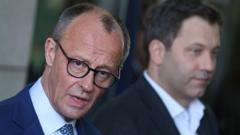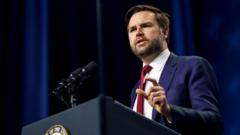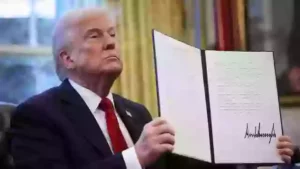Germany's conservative party has secured a coalition agreement with the Social Democrats to govern, following a turbulent political period and economic recession.
Germany's Conservatives Strike Deal with Social Democrats to Form New Government

Germany's Conservatives Strike Deal with Social Democrats to Form New Government
Friedrich Merz announces coalition aimed at stabilizing Germany's economy and addressing migration issues.
Germany's conservative leader Friedrich Merz has announced a landmark coalition agreement with the Social Democrats, marking a significant step toward forming a new government for the country after the previous administration's collapse five months ago. Merz, age 69, emphasized the partnership's commitment to delivering a "strong government capable of action," aiming to reassure citizens and the European Union of Germany's direction amid challenging economic circumstances.
The coalition's emergence follows fiscal instability heightened by US trade tariffs initiated under former President Donald Trump. In a strong statement, Merz declared, "Germany is back on track," as he pledged to meet defense responsibilities and restore the nation’s competitive edge. The conservative Christian Democrats, who won the federal elections in February, have faced mounting pressure to resolve Germany's political stagnation, particularly with populist sentiments rising as the far-right Alternative for Germany (AfD) gained momentum in opinion polls.
The newly formed coalition promises decisive reforms targeting economic stability, migration control, and military revitalization. Merz highlighted the government's urgency in addressing voter concerns raised in the February elections, including measures to curb irregular migration and impose border regulations. The AfD criticized the agreement as inadequate and accused Merz of capitulating to the Social Democrats' agenda.
Key aspects of the agreement include enhanced defense spending and investment to modernize Germany's ailing infrastructure. Merz indicated an intention to adopt a "Swedish model" for voluntary military service to boost the Bundeswehr, Germany's armed forces, while also pledging comprehensive assistance to Ukraine.
Despite the fresh faces in government, continuity is expected to remain under the defense ministry, with current Social Democrat Boris Pistorius likely retaining his position. However, skepticism persists regarding the coalition’s plans addressing Germany's ongoing economic downturn, with critics like Sahra Wagenknecht labeling the situation as "Merzession," suggesting little hope for resolution.
As the coalition awaits approval from party members, political observers remain watchful, especially with recent polling showing Merz's conservatives trailing just behind the AfD. "Political change is coming," pledges AfD co-leader Alice Weidel, reflecting a changing landscape in Germany's political arena.





















